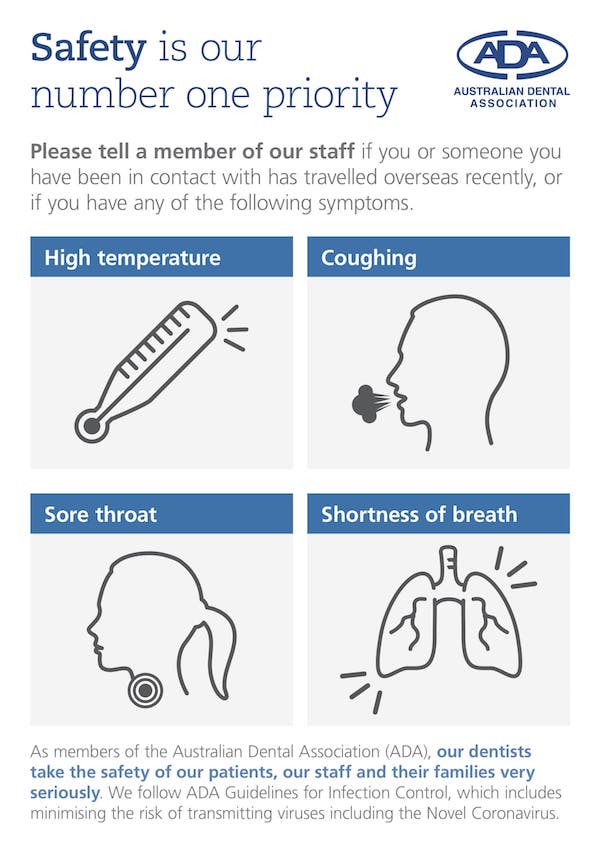There has been a lot of recent concern about COVID-19, or the novel coronavirus. As a dentist and a Geelong local, I share your concerns. The prevention of transmission of infectious diseases is always at the top of my mind because this is something that my team and I are aware of every day.
In this message, I will share with you the many ways our practice protects our patients, community and ourselves from the risk of contracting illnesses and diseases, including coronavirus.
Keeping You Safe
Our infection control protocols have always been exemplary. Additional protocols have been introduced in our practice to protect the safety of all patients and staff. These include:
- Detailed screening of patients before they attend the practice
- Patients are asked to sanitize their hands upon entry into the practice
- There is physical separation of seating in the reception area, and we comply with the 1 person per 4 square metre directive
- Air purifiers (with 99.95% filtration) have been installed at Reception and in every room
- Patients are asked to use a disinfecting (pre-procedural) mouthrinse prior to treatment
- Our team uses single-use personal protective equipment for every patient
- Patients are asked to sanitise their hands at the completion of their appointment
- All surfaces that are regularly touched are decontaminated frequently throughout the day
Infection Control
We use the term “infection control” to describe the many steps we take to prevent the spread of bacterial, viral and other infections between patients, team members and the broader community. In a nutshell, it includes everything we do in our practice to ward off the spread of germs so that people don’t get sick.
Some Examples of Infection Control Measures That We Carry Out for Your Safety
These “Standard Precautions” are the essential processes of infection control. They include:
- Implementation of good hand hygiene consistent with the national hand hygiene initiative from Hand Hygiene Australia (HHA)
- The use of personal protection equipment such as gloves, masks, eye protection and protective outerwear
- Safe handling and disposing of contaminated waste and sharps
- Effective cleaning of the treatment rooms before and after patient care, and of the practice generally
- Placement of environmental barriers, such as plastic coverings, on surfaces that are otherwise difficult to keep clean.
There are also infection control practices specific to dentistry. These include:
- Steam sterilisation (autoclaving) of instruments and the accompanying testing, monitoring and maintenance of equipment to ensure the autoclave works properly at all times.
- Single-use items (for items that are difficult to decontaminate)
- Maintenance of clean waterlines, therefore protecting water quality
- The utilisation of handpieces with anti-retraction valves to reduce the risk of transmission of pathogenic organisms
- Specific decontamination protocols related to specialised equipment and devices
- Specific decontamination procedures relating to dental impressions and devices that are worn in the mouth
- And much more.
Our Team
- Every team member is thoroughly trained in infection control procedures. We follow our procedures precisely and consistently and review our practices regularly.
- Each team member undertakes a strict regimen of personal immunisations
- We have a customised Practice Manual on Infection Control, which outlines our Infection control protocols and procedures for our practice and patient care.
I have great confidence that we are doing everything possible to protect our patients and community from the impact of not only the current threat of novel coronavirus but of all potentially transmissible diseases, including flu and the common cold.
What About Specific Protections Against the Novel Coronavirus (COVID-19)?

Thorough infection control measures, including respiratory hygiene (cough etiquette) and good hand hygiene, are essential to reducing the spread of COVID-19 infection. This is true for health settings, in workplaces, in public areas and in the home.
Our practice has all the necessary systems in place to ensure very high-quality infection control.
The Australian Dental Association has also recommended that we assist patients in self-identifying their status as being potentially infectious. Risk factors include:
- Clinical Symptoms – including fever or an acute respiratory infection, with or without fever
- Close or casual contact with a confirmed case of COVID-19 or with someone who has recently been in countries designated as having a high or moderate risk by the Australian Department of Health
If you fit into one of these categories, and your dental appointment is not urgent, please consider delaying your treatment for at least 14 days.
If treatment is urgent, we ask you to contact us to let us know your risk status so we can provide you with the best possible care.
Where to Get More Information About Novel Coronavirus
We encourage all of our patients to keep abreast of the latest medical advice and official reports on the Australian Government website:
https://www.health.gov.au/news/health-alerts/novel-coronavirus-2019-ncov-health-alert
Infection Control Regulations
We comply with strict infection control regulations as set out by the following bodies:
- The Dental Board of Australia’s Policies and Guidelines
- The Australian Dental Association’s Guidelines For Infection Control
- The National Health and Medical Research Council’s Australian Guidelines for the Prevention and Control of Infection in Healthcare (2019)
- Standards Australia’s AS/NZS 4815, a Standard which specifies the requirements and practices necessary for the effective and safe reprocessing, storage, handling and transportation of reusable medical devices (RMDs) in human health care
- Workplace Health and Safety regulations
Here To Serve
We are happy to answer questions you have about what we do to keep you and your loved ones safe at the dentist.
We are here to serve existing patients of the practice as well as new patients.
